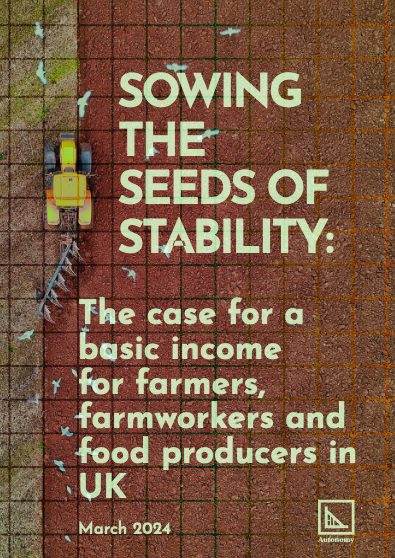Photography by Heather Birnie.
“We have to believe that a better world is possible – and I think this is a really tangible step towards that better world…. Give them [farmers] money and trust them. They deserve to live a life of dignity”
Jo Poulton
Jo Poulton is a LWA member and (at the time of writing) is a seasonal grower at the 8 acre Tuston Market Garden in Herefordshire, growing vegetables for a small CSA (20 members), Ludlow and Teme Valley farmers markets and restaurants in Ludlow, too. In this Landtalkers profile, Jo shares how her own financial insecurity and uncertainty as a trainee led a national campaign for a Basic Income for Farmers (BI4Farmers), and why it could be the answer to a more diverse, resilient and innovative food and farming sector.
I first met and interviewed Jo at the Land Skills Fair back in 2023. A year has passed by the time we sit down for a Zoom conversation for our latest Landtalkers member profile, and in that time the seed of an idea has exploded into a national campaign with international media coverage. New agri-environment scheme proposals and farmer protests have drawn the plight of farmers into the spotlight and provided the perfect timing to moot the idea of a Basic Income for Farmers.
____________
Just four years ago, Jo was working a desk job, producing children’s television in Bristol. The pandemic changed the course of her working life. Observing the fragility of the global food system at times of crises, she suddenly found herself drawn to a completely different career; “‘Oh gosh’, I thought, in the future we’re going to need so many growers – especially agroecological growers” – I could really see that future vision and wanting to move towards it and be a part of it”.
Jo quit her job in television and moved to Cumbria to train as an organic grower. Her skills with sign-language led to a voluntary role at Growing Well, a community food project, and she found some training part-time with Newton Rigg and a place on a 40-week FarmStart programme at The Plot, Lancashire. Though she later had some paid work as a grower in the Eden Valley, it was very precarious – there was no sick pay or annual leave and no financial safety net; “When you’re sick and stressed about not making any money, it makes you more sick.”
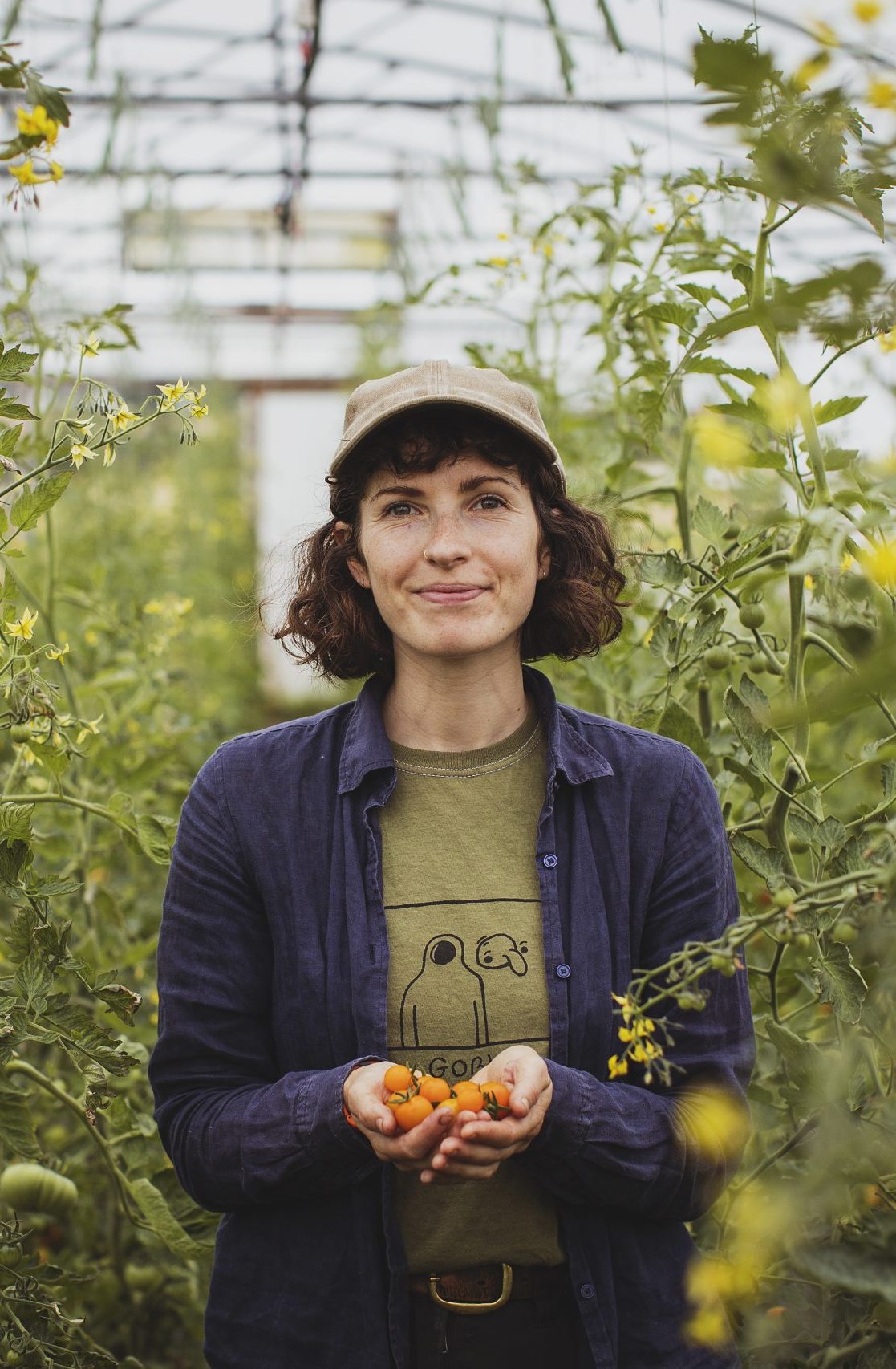
Jo Poulton
“The lack of paid traineeships was a really big barrier for me – the financial struggle overshadowed the whole positive learning experience that I had”
Jo Poulton
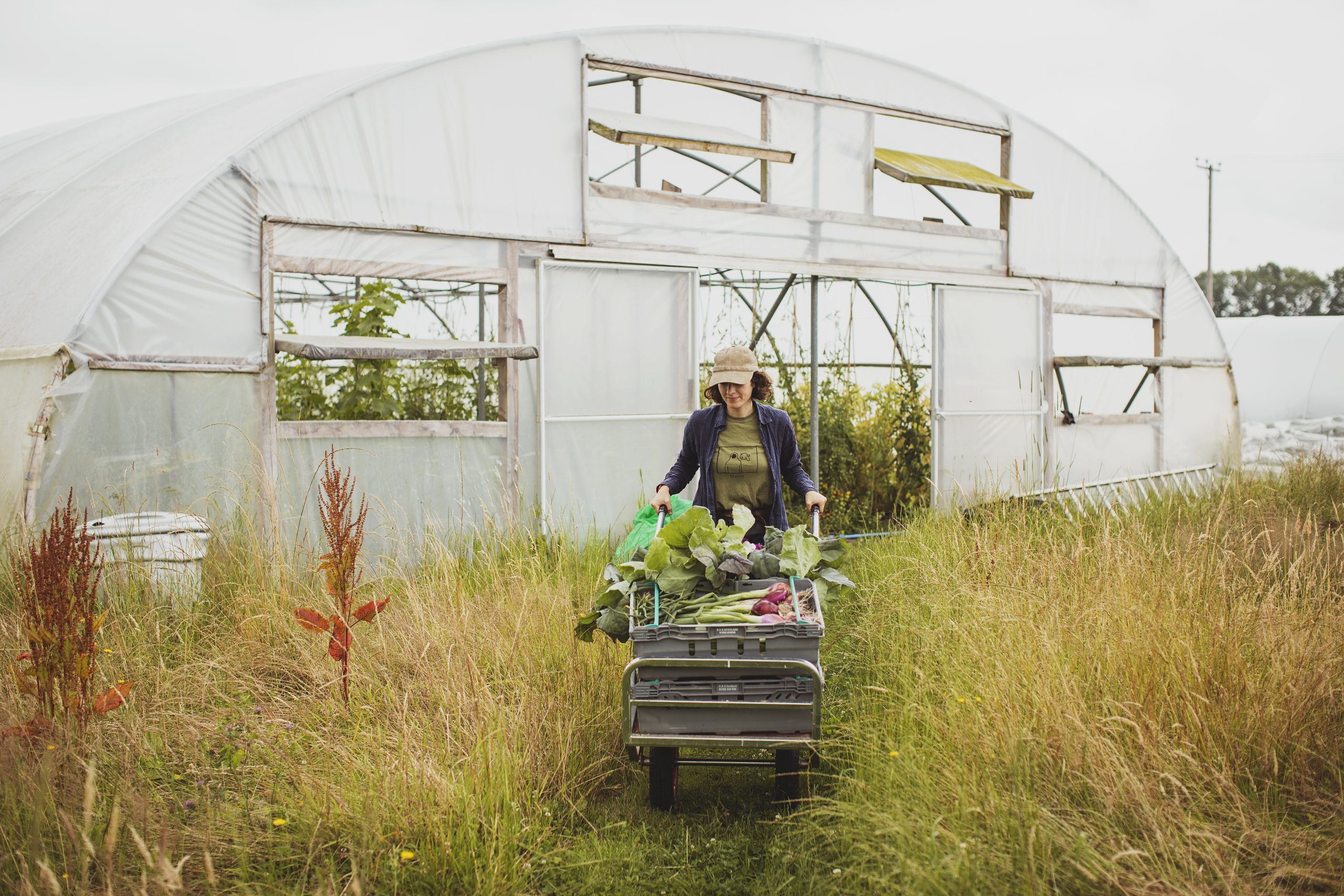
Jo Poulton
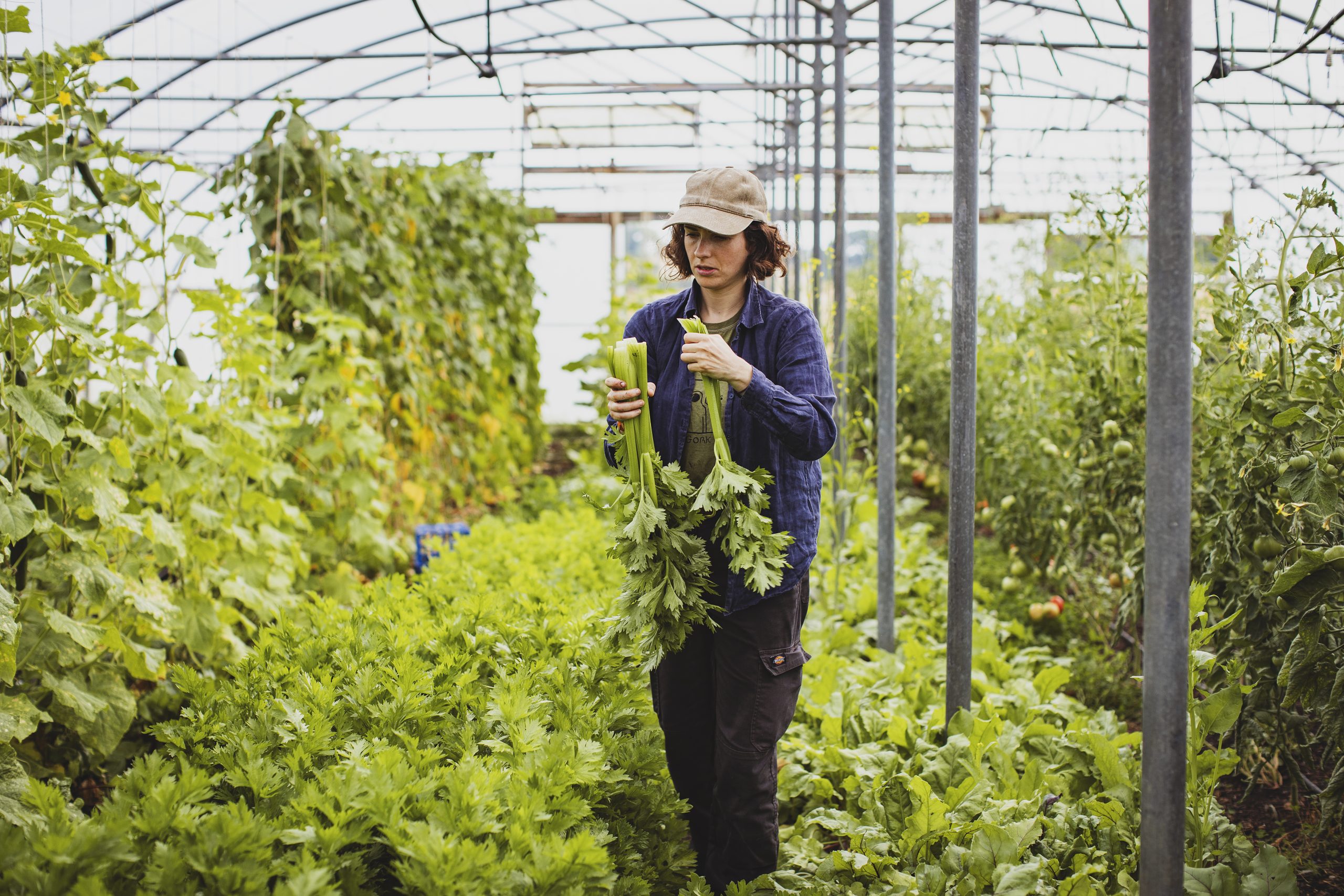
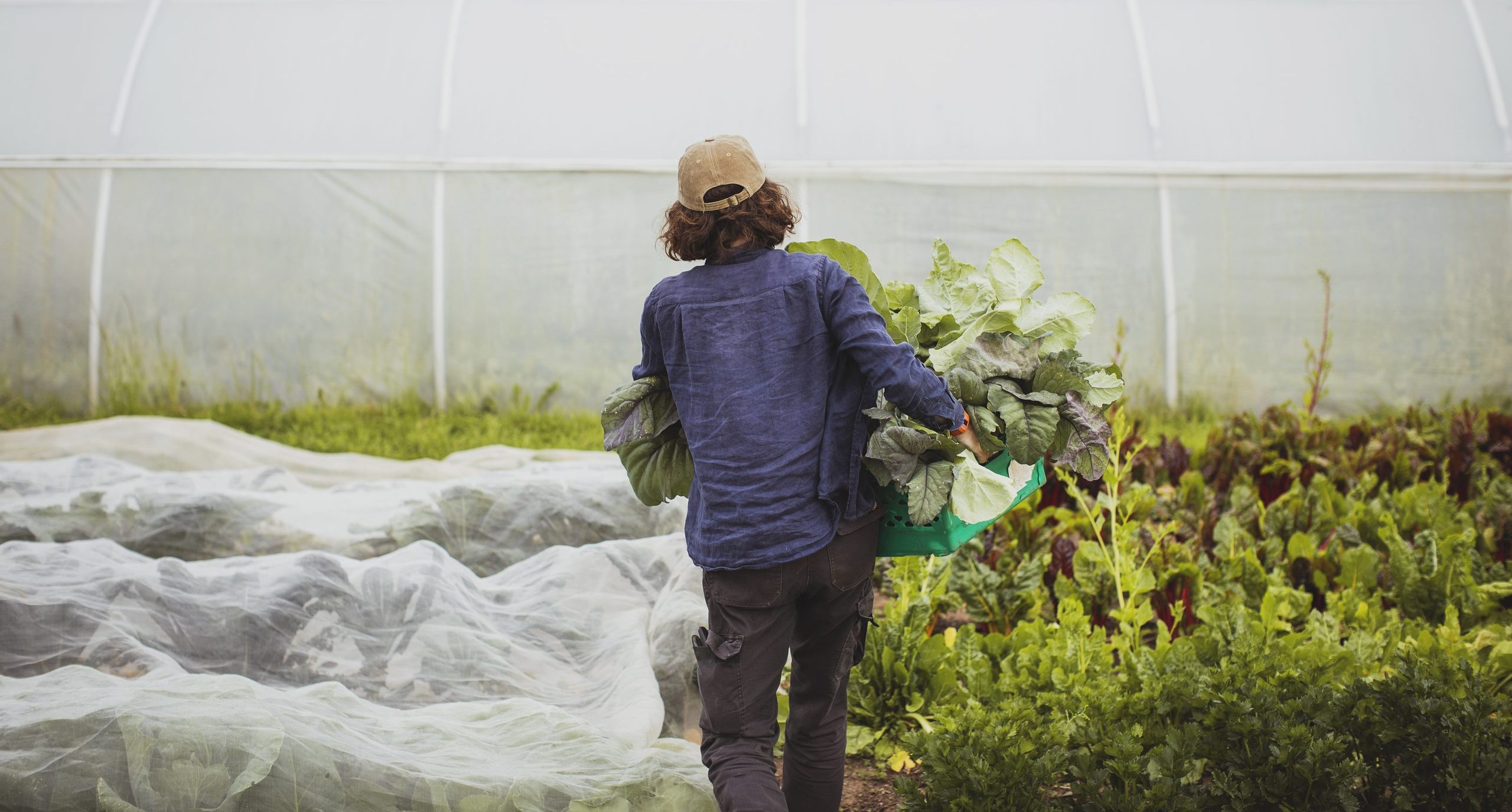
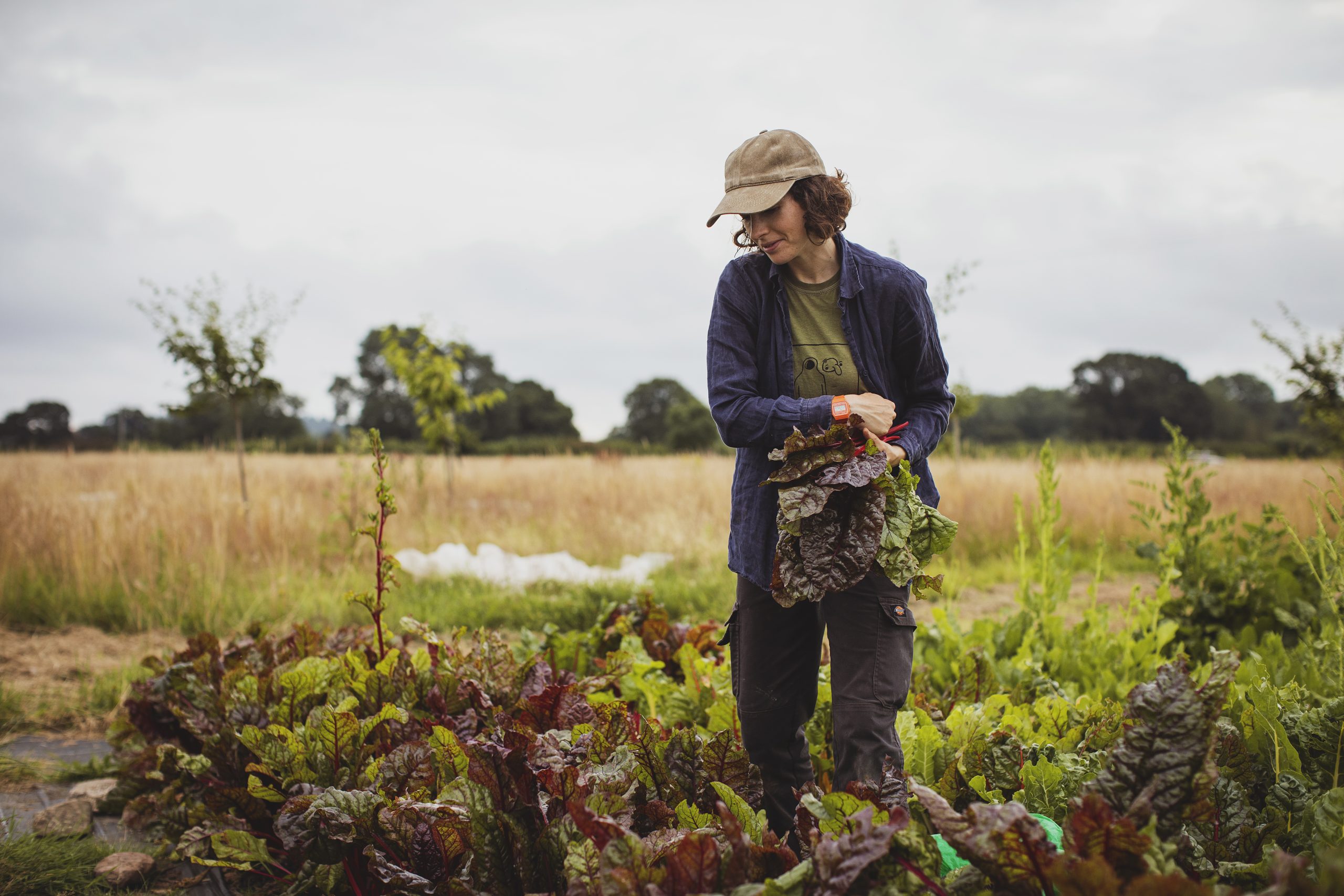
Jo couldn’t see a clear route for how she was going to make being a seasonal grower work financially – “The lack of paid traineeships was a really big barrier for me – the financial struggle overshadowed the whole positive learning experience that I had. I wanted to grow. I wanted to be a grower. But I couldn’t see how it would work within the current system, so I thought, okay, how can we slightly reconfigure the current system to enable people who have the passion and the want to get into growing, the ability to do so.”
And the idea for a Basic Income for Farmers was born.
“I started thinking about it whilst I was training, and adding up how much money I had each month”, Jo says.“It came from a deep respect for the people I was working for. I could see how stressed they were – they weren’t paying themselves properly so how could they pay farmworkers properly?” This story is far from unique amongst trainees, new entrants and many of our members, and speaks to the precarious footing many farmers find themselves in across the country. “I’m landless and essentially a seasonal worker. I have to go off and find work for the winter. I’m seeing friends who are farmers leaving the industry because it’s just too precarious.”
“It came from a deep respect for the people I was working for. I could see how stressed they were – they weren’t paying themselves properly so how could they pay farmworkers properly?”
Jo Poulton
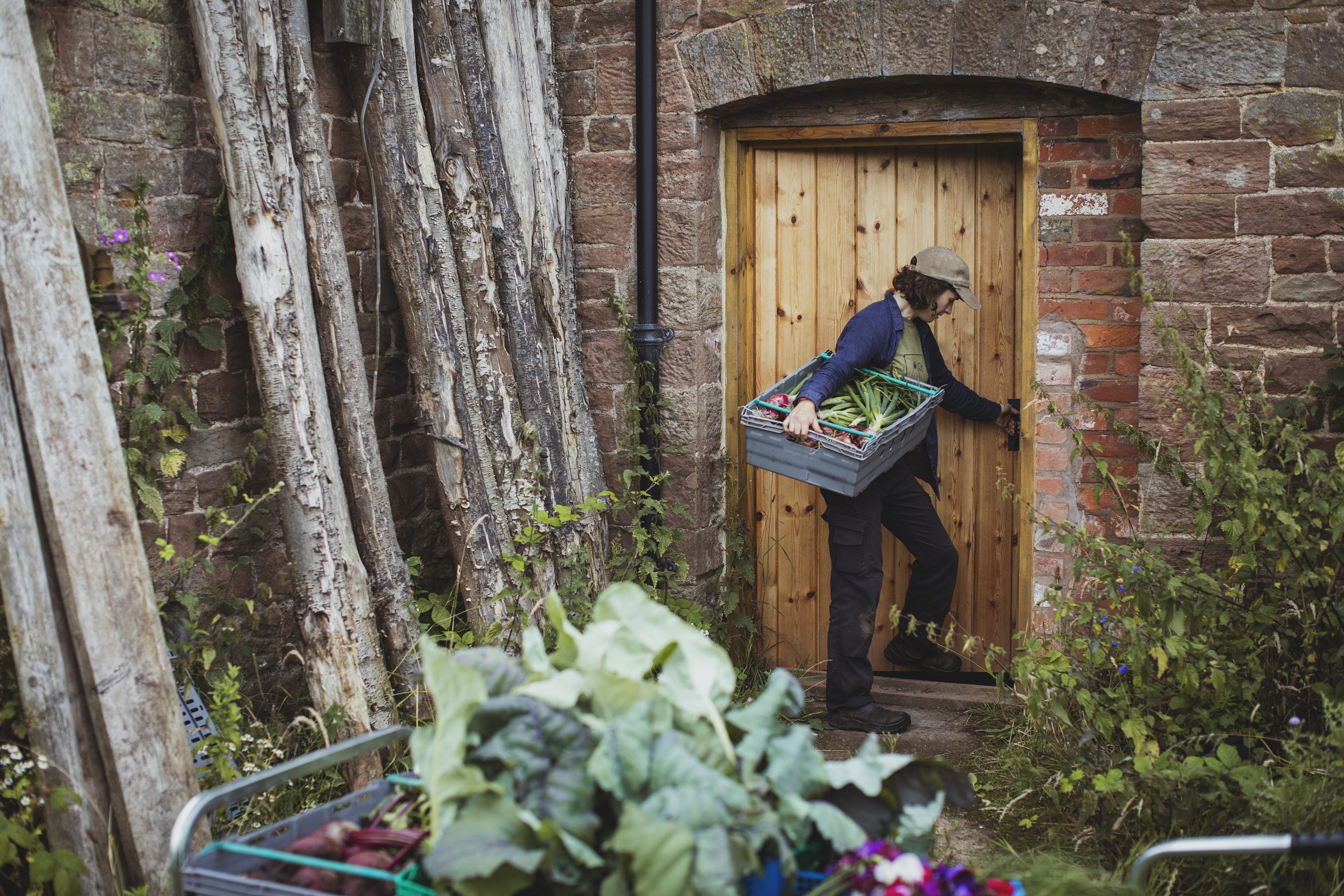
Mental health challenges amongst the farming population have come under the spotlight recently, with 95% of young farmers agreeing that mental health was the biggest hidden danger in the job. Farmers and food producers are 1.7% more likely to commit suicide, according to a study by Yellow Wellies, the Farm Safety Foundation. In 2022, a DEFRA study found that the average take home annual pay for a farming household was £17,800, (less than £9000 per individual) which is over £20,000 lower than the £29,000 minimum income standard required for an individual to have a decent standard of living, according to the Joseph Rowntree Foundation.
“From workers to landowners, livelihoods in agriculture are often precarious. A lack of funded pathways and financial support makes careers in producing food both hard to access and difficult to sustain. Financial insecurity impacts the mental and physical well being of those who produce our food whilst weakening the overall strength of the local food system. Finding ways to support these livelihoods will be critical to building the resilient, sustainable, and just local food systems we need.”
Sowing the Seeds of Stability: The case for a basic income for farmers, farmworkers and food producers in the UK
Jo tells me that it was at her very first LWA North West meet-up that she first confided in someone about this idea for a BI4Farmers, finding a very positive response from an elder LWA member who was well aware of the challenges in agroecological farming; “her energy definitely catapulted the whole thing. The Basic Income 4 Farmers campaign wouldn’t exist without the Landworkers’ Alliance.” Though Jo was initially rejected for funding to explore the idea of a Basic Income for farmers, she persevered, and with the support of the Landworkers’ Alliance, decided to organise some initial online conversations with anyone interested in talking it through – 120 signed up, and a campaign was born. There was clearly a demand for this policy idea, and so from those initial conversations, a small working group was formed and met once a month to start to form what this policy proposition might look like.
“The Basic Income 4 Farmers campaign wouldn’t exist without the Landworkers’ Alliance”
Jo Poulton
So what did they come up with?
A Basic Income for Farmers for all agricultural workers individually who are contributing to local food production – a direct, regular unconditional cash payment. It would not be tied to the land, like ELMS or CAP – it would be for the individual. It would be on top of a wage, or business income, or any agri-environment schemes or subsidies; “We need to de-link the payment from the land”, Jo argues, “and give it to the individual – this person who has all of these skills, knowledge, passion for growing food – making sure that they themselves are secure. They’ll become more secure in their work and the local food system will be more secure – it will ripple outwards.”
A Basic Income for Farmers would provide a basic safety net of income to all farmers, food producers and agricultural workers, no questions asked. It would be over and above any subsidies or agri-environment schemes and provide the social and financial recognition farmers and food producers deserve for the vital public service they provide.
“BI4Farmers presents us with a golden opportunity for a sustainable farming future. It’s an opportunity we must not miss.”
Ruth West, Co-founder of Oxford Real Farming Conference.
Over the 9 months following those initial online conversations amongst the working group – which includes LWA members Hamish Evans (Middle Gr0und Growers), Katie Pollitt (community farmer, LWA Midlands), Keziah Suskin (Biodynamic farmer) and Alice Rixon (The Veg Lady) as well as Jas Tribe (Lovebrook CIC), Kevin McGrother (Cheesemaker) and Cleo Goodman (The Basic Income Conversation) – a summary report was written – Sowing the Seeds of Stability: The case for a basic income for farmers, farmworkers and food producers in the UK – outlining the current challenges of UK farming and how a Basic Income could meet them, and then published by the Autonomy Institute. It had been the intention to launch the report at Oxford Real Farming Conference (ORFC) in early 2024, but it was delayed. But a big ORFC session turned out to be incredibly useful in feeding into the final stages of the report, which was launched on 4th April 2024. When asked how a Basic Income would impact their lives session attendees said:
“It would grow local food culture, there would be more food hubs & markets”
“It would allow me to grow a bigger diversity of crops, experiment more and take risks”
“It would make me much less grumpy”
“It would build community resilience, get more local people on my farm”
“It would boost local procurement to schools, hospitals, prisons”
“It would help me get more involved in local issues”
“It would allow me to carry on farming”
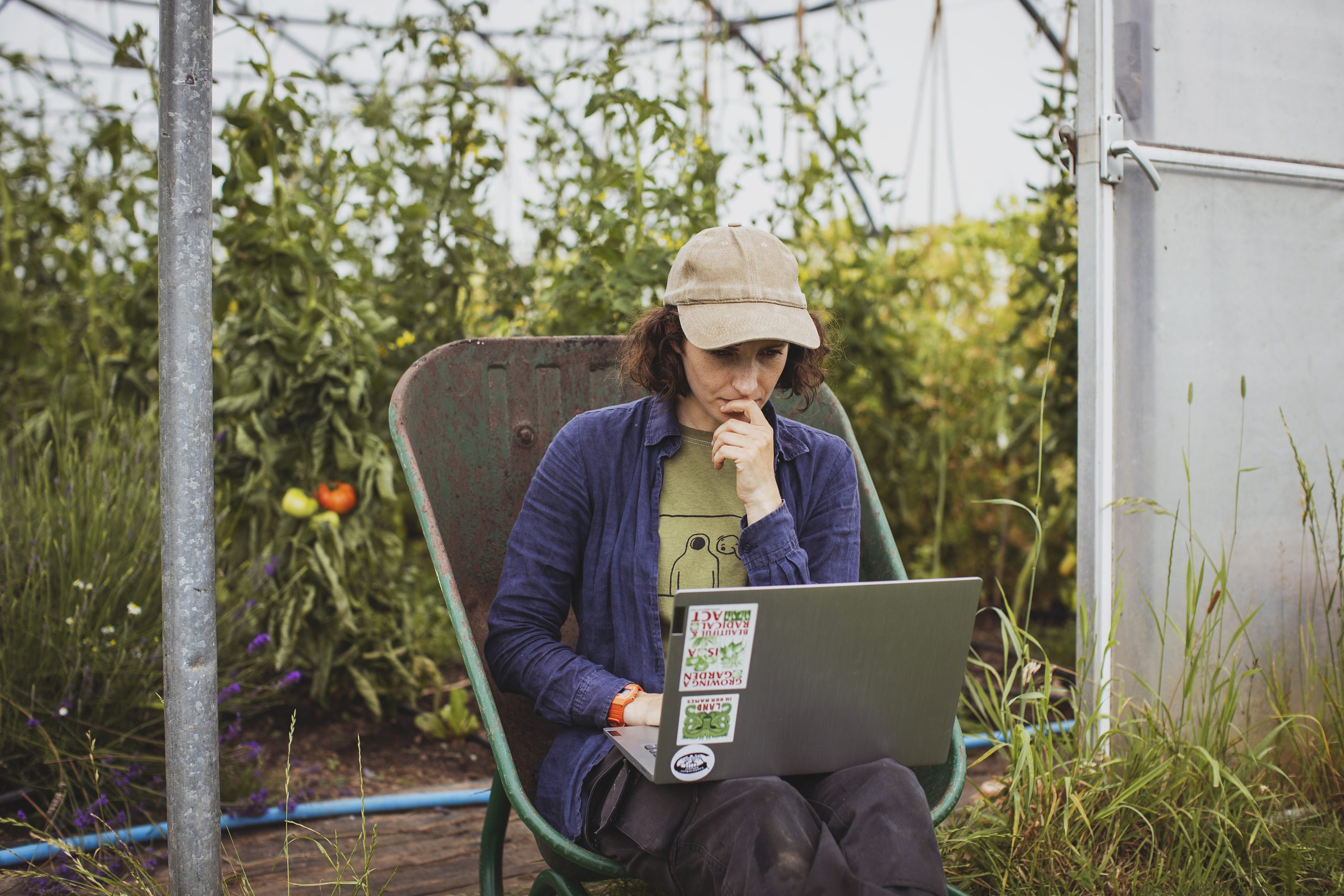
“ If we’re getting people in the mainstream talking about farmers’ livelihoods, the value and recognition of farmers, then for me, our work is done.”
Jo Poulton
The report was launched during a particularly pregnant moment for the farming sector. Across Europe and here in the UK, farmer protests amassed to draw attention to changes in agricultural payments and unfair treatment by supermarkets.
Suddenly, the challenges facing farmers were national news. The timing was perfect, and soon Jo and her fellow founders found themselves speaking to Sky News a GB News, amongst others, and the report was featured by Al Jazeera, Farmers Weekly a The Guardian. Jo and the team were excited and positively motivated by that; “Maybe this is the moment to be talking about this. If we’re getting people in the mainstream talking about farmers’ livelihoods, the value and recognition of farmers, then for me, our work is done.”
But their work was far from done. A few weeks after our Zoom conversation, I bump into Jo at Groundswell Regenerative Agriculture festival, where she is joining the programme to make an 8-minute pitch for the Basic Income for Farmers. Jo is, by now, well versed in media interviews and the campaign is still gaining press traction – it was recently featured in Steph Wetherell’s article on Wicked Leeks, for example. Oxford University has invited the team to pitch a workshop and Jo has been contacted by the President of Catalunya to see how a similar scheme could be piloted there. And the BI4Farmers team are now deep in the next phase of policy design, looking at how a proposal could fit into the four nations, how migrant and seasonal labour could be supported and what a pilot study might look like – will it take in a single bioregion? How will it bring in a cross-section of farmers, growers, seasonal workers, big landowners, tenant farmers and landless workers? It’s now time to create a strong evidence base for what this policy could do.
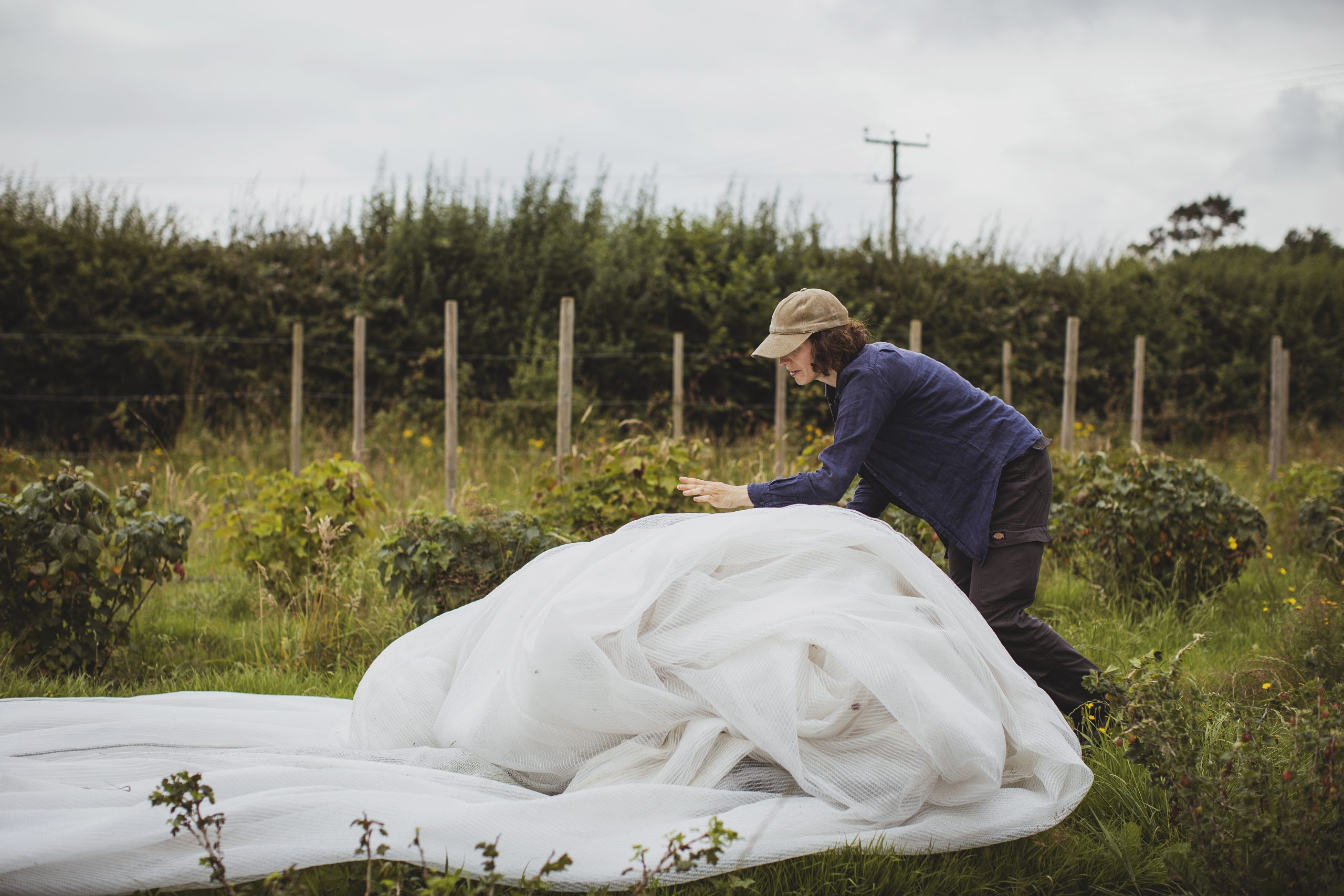
“When I’ve spoken to farmers about it, there is this sense of hope. I think hope is a really powerful tool.” During testing and sessions with farmers and landworkers, feedback has been that the policy would allow farmers to better plan for the future, it would take some of the risk out of farming, help farmers feel more valued and might lead to better sleep!
“Even if this payment was just purely to keep our farmers healthy, mentally and physically, then that would be great. But we’re also thinking that farmers would go on to have a better impact on the land and the community because of this payment.” Not only would a Basic Income for farmers support farmers suffering through a difficult transition time, but would also incentivise and encourage innovation and enthusiastic participation in environmental actions, assures Jo.
“When I’ve spoken to farmers about it, there is this sense of hope. I think hope is a really powerful tool.”
Jo Poulton
I end our conversation by asking Jo what her vision for a world 5 years beyond a Basic Income for Farmers;
“Farmers markets in every town, squares bustling with people. A world in which there is an incredible diversity of crops, but also of people working the land, getting to know their local community through the power of food. Farmers have more time – a little bit of wiggle room, breathing space to become engaged politically, with a voice and more bargaining power. A strong, communal, positive future”
Jo presents a beautiful vision for a fair, diverse and agroecological future, where the food and farming sector is adequately supported to thrive – and this policy offers hope and a roadmap to get there. We can certainly see how it could support our members to thrive for the long term as farmers as growers. What is it that Sandhya Anantharaman said? “Basic Income doesn’t solve every problem. But it makes every problem easier to solve.”
“We have to believe that a better world is possible – and I think this is a really tangible step towards that better world.” For Jo, the solution is simple; “Give them [farmers]money and trust them. They deserve to live a life of dignity”
*** We are delighted to share that the Basic Income for farmers campaign has recently secured funding to enable Jo to work part-time on the campaign for the next 6 months to raise money for a consultation process and pilot feasibility study & economic modelling. And that’s not all! We heard from Jo this week that she’ll be starting a secure co-lead grower role at CSA and co-op Sims Hills Shared Harvest at the end of October in Bristol! What a happy footnote! ***
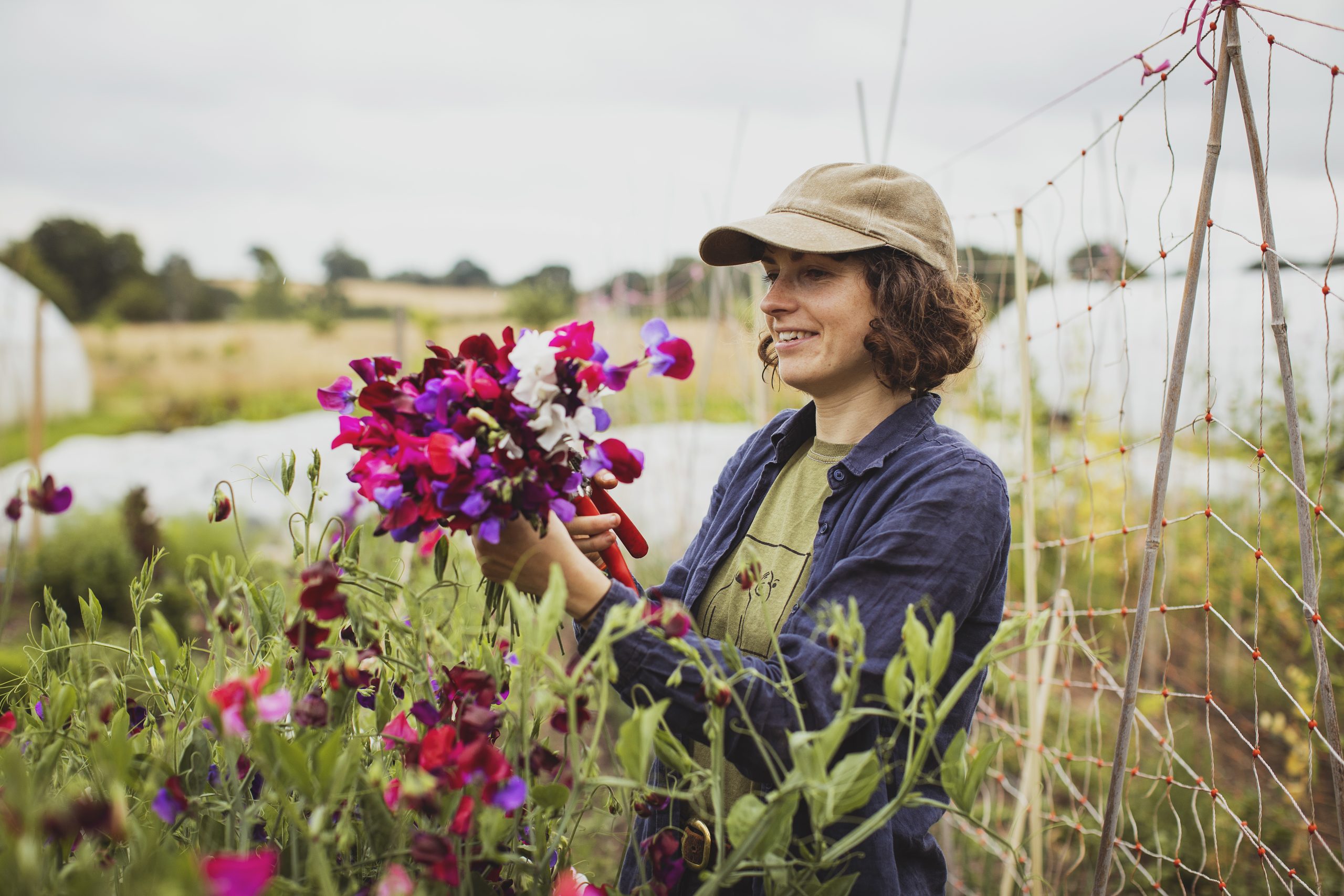
If you’d like to find out more about the Basic Income 4 Farmers (BI4Farmers) campaign, or get involved, you can join an explorative conversation using the Basic Income Toolkit on Wednesday 13th November 2024 at 7pm GMT, on Zoom, yma.
Jo would also love to hear more voices speaking up for a Basic Income for Farmers, either through their Community Survey, yma, or by recording a video of support to post on social media, tagging @BI4Farmers, to help demonstrate a demand for this policy and the impact it would have. With thanks to Farming The Future a The Social Change Nest, individuals and organisations can now directly support the campaign by donating to running costs and supporting the core team on the campaign, yma.
Thankyou for reading Jo’s story. For more ‘Landtalkers’ LWA member stories, click yma.
Do you have a story to tell? Would you like to feature in our ‘Landtalkers’ series of member profiles like this one?
We are so proud of the work that our members’ are doing in the fields, woodlands, coastal areas, towns and cities of these lands. We think your voices deserve to be heard, and we want to celebrate the diversity, power and breadth of our movement, give you a platform to share what you are doing on land and demonstrate the possibility of agroecology at this moment as the great challenges of our times converge.
Are you active in your region – maybe you’ve got something to say about the challenges and opportunities where you are? We’d love to hear from new entrants or landless workers feeling their way into agroecology and understand what that’s like for you. Maybe you’re breaking new ground, forging into a sector where you don’t see people like you represented.
All sectors, scales and places in the supply chain – farmers, growers, sustainable foresters, land-based craftspeople, food processors, seaweed harvesters, millers, machinery operators and more…. We’d love to hear from you. Tell us your story or nominate someone on your farm, business, region, sector or from FLAME, REAL, OOTL or Wome

